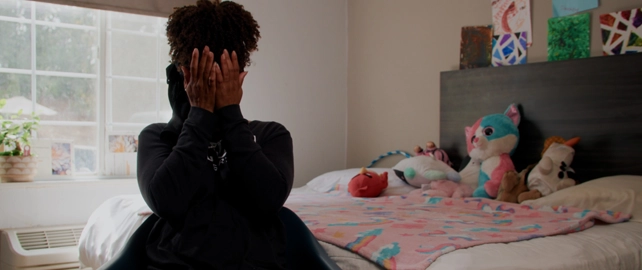Story
Upfront Gwinnett: The Hidden Homeless; Episode 1
Posted: December 6, 2024
Story Link: https://www.gwinnettcounty.com/home/stories/viewstory/-/story/the-hidden-homeless-episode-1
Homelessness often hides in plain sight. To most, it looks like people sleeping in cars, tents, or on sidewalks, but for thousands of families across the country, it takes on less obvious forms. Extended-stay motels and couch surfing have become lifelines for those with nowhere else to go—offering temporary refuge but little stability.
In Gwinnett County, a young mother of five, Purity Muhammad, knows this reality all too well. She has spent months living in a cramped extended-stay motel room with her children, fleeing domestic violence and searching for a better life.
A Life in Transition
For Muhammad, the motel was both a sanctuary and a prison.
“It’s one of our struggles day-to-day,” she said. “How I keep it organized is by having to do it multiple times a day and teaching [the kids] how to do it.”
Purity fled abuse in Arizona, Florida, and Georgia, seeking safety for her children, all under the age of nine. Despite finding temporary refuge, the challenges of survival persisted.
"I remember days where I’d look at my children and just start praying and crying, ‘Lord, help me,’” she said.
Between juggling odd jobs like DoorDash and Uber Eats and paying weekly motel fees that often exceed traditional rent, Purity struggled to stay afloat.
“I’ve been stressing. I’m $400 behind on my room, and I’m just trying to figure it out,” she explained. “I put $20 on my room, then $80—just whatever I can.”
The Reality of "Hidden Homelessness"
Families like Purity’s are often left out of federal homelessness counts because they are not considered "unsheltered" under the Department of Housing and Urban Development (HUD) guidelines.
Matthew Elder, Gwinnett County's Housing and Community Development Director, highlighted the gap in how homelessness is defined:
“They’re not unsheltered, but they are homeless. They don’t have the rights of someone renting an apartment or owning a home,” he said.
This distinction leaves families in extended stays without access to many critical resources. Elder noted that during the 2023–2024 school year, Gwinnett County had the highest number of homeless students in Georgia. Over 90% of these children lived in situations like Purity’s, but they didn't qualify as "homeless" under HUD's definition.
No End in Sight
According to Joy Monroe, founder of the Single Parent Alliance and Resource Center (SPARC), weekly motel rates often made it nearly impossible for families to save or escape.
“Motels on the low end are $350 a week. On the high end, they can be $900,” Monroe said. “Even if you make decent money, there’s nothing left over to save.”
Muhammad’s story showed just how tenuous life in a motel could be. Recently, she was handed an eviction notice, leaving her with less than 24 hours to come up with the money to stay. Thankfully, her rent was paid by an angel investor.
“It’s hard to keep going some days,” she admitted. “But I’m doing everything I can for my kids.”
What Comes Next?
Families like Muhammad remain part of the “hidden homeless” in Gwinnett County and beyond. Their struggles highlight a larger issue: the lack of affordable housing and the systemic barriers that prevent many from breaking the cycle of poverty.
In the next installment of Upfront Gwinnett: The Hidden Homeless, we’ll explore the link between motels and human trafficking.

